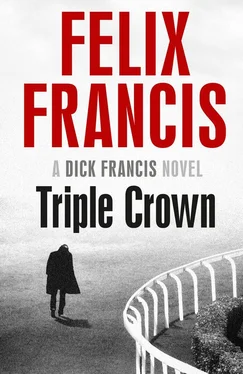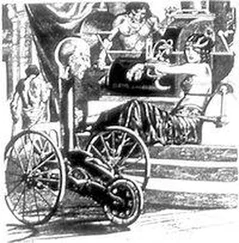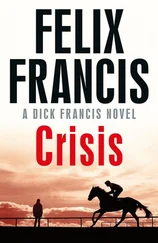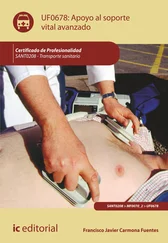Frank and I completed a full sweep of the clubhouse and the grandstand without finding anything out of place.
‘Do you and the others have a specific job to do here?’ I asked as we went through the private suites on the fifth level.
‘Not really,’ he said. ‘They like us to provide a presence and react if necessary. But we won’t get into these sections tomorrow. The Vice President is coming and his security is the job of the Secret Service. They’ll have the place sealed up as tight as a tick.’
‘It must be confusing having so many law-enforcement agencies all working at the same place. Is there an accepted hierarchy?’
‘Not officially, but the Secret Service act like they’re the top dogs.’
‘And are they?’
‘I suppose so. They’re here to protect the Vice President, and what they say goes. They won’t be interested in the racing, only in the people.’
‘While you’ll be busy watching the horses?’
‘I keep an eye out for everything. But the racing integrity work is the responsibility of the state racing commission. They’ll contact us only if they think anything suspicious is going on.’
‘Have they done that before?’
‘A few times. Betting matters, mostly. Especially when someone is trying to avoid paying the tax on their winnings.’
‘Are racetrack winnings taxed?’ I asked with surprise.
‘Sure are,’ Frank said. ‘All gambling winnings are considered to be taxable earnings. Even if you win a car or a trip on Wheel of Fortune , you have to pay income tax on its market value.’
‘So how do people try to avoid it?’
‘Multiple identical bets,’ he said. ‘Any payout over five thousand bucks is subject to hefty withholding tax by the track. So big bets are rare. Much more sensible to have several smaller identical bets on separate tickets. Then, if they win, you collect from lots of different windows, keeping each one below five grand, and don’t tell the IRS anything.’
‘Clever,’ I agreed.
‘Yeah, maybe it is, but it’s also dishonest. And we’re getting wise to that tactic. The IRS is busy installing cameras at the track payouts windows to record faces.’
‘Spoilsports.’
He laughed. ‘Whose side are you on?’
‘Not the taxman’s,’ I said, ‘that’s for sure.’
‘It’s my job,’ he said. ‘Anyway, some big gamblers now get their friends and family to collect for them so that no one individual collects more than five grand. But then those people are required to declare it on their own 1040s, or Uncle Sam might come knocking. There’s nothing as certain as death and taxes.’
‘It still seems unfair to tax a slice of good luck.’
‘Lotto and casino winnings are taxed too. You know those people who put a dollar in the big slot machines in Vegas, pull the handle, spin the reels and win a million? You see it sometimes on the TV.’
I nodded.
‘The IRS takes a quarter straight off the top, there and then. And there’s more to pay the following April fifteenth.’
I shook my head in disbelief.
‘What happens in England?’
‘There is no tax on racetrack winnings. Whatever it says on the ticket, that’s what you get. It’s the same for all gambling. All payouts are free of any form of tax.’
‘Even the lottery?’
‘Absolutely. Every sort of winnings.’
‘Wow,’ he said. ‘I think I’ll move to England.’
On Friday evening, with Frank Bannister still acting as my chaperone and mentor, I went to the Fillies and Lilies party at the Kentucky Derby Museum before moving on to one of the other Derby-eve events in downtown Louisville.
The only problem was that we couldn’t have anything to drink.
‘Not while on duty,’ Frank explained. ‘Not with this baby on my belt.’ He tapped the Glock 22C under his jacket. Although unarmed myself, I felt obliged also to be teetotal for the evening.
There were several other FACSA special agents at both events.
‘Are y’all havin’ a good time?’ Larry Spiegal asked in his deep Southern drawl at the Fillies and Lilies event.
‘Sure are,’ Frank said. ‘But there are more menfolk here in hats than I’ve seen outside a rodeo.’
I looked around and it was true. Most of the men were sitting at tables either in small narrow-brimmed straw trilbies or large ten-gallon cowboy hats. I thought it bizarre to wear hats indoors but my new colleagues thought nothing of it.
‘A true cowboy always wears his hat,’ Frank said, ‘except when greeting a lady.’
Clearly, they didn’t consider that the scantily dressed young fillies at this party were ladies.
‘But we’re inside,’ I said.
‘Inside and out,’ Frank said, ‘makes no difference.’
‘He’ll wear it even when taking a shit,’ Larry added unnecessarily.
‘Especially then,’ Frank confirmed. ‘Keeps it off the floor.’
Yet another reason why I concluded that Americans were a rum lot.
I finally turned out my bedside light at almost two in the morning. Not that I’d been partying the whole time.
Frank and I had returned to our quarters about eleven but I had spent the next three hours continuing my examination of the bank statements of FACSA’s racing section.
In the first pass, I had discovered not a single suspicious deposit into any of the accounts. But I hadn’t really expected to. Someone who had been clever enough so far to avoid detection would not have been so stupid as to make large payments into their own personal bank account.
They might, of course, have a second bank account, which they hadn’t declared. But that wasn’t as easy as it sounds. Every US bank is required to disclose the names of all account holders to the tax authorities, together with their dates of birth and Social Security numbers.
Maybe the mole was using an offshore account.
However, that option was also fraught with danger. Under the new Foreign Account Tax Compliance Act, the US Treasury forced a deal with over a hundred other countries compelling their banks to report the names of all US citizens holding accounts with them directly to the IRS. Even the traditional offshore tax havens such as the Cayman Islands, Bermuda, the Isle of Man and the Channel Islands had all signed up.
Basically, hiding illicit money in a bank anywhere is now extremely difficult, and is getting more so every year as governments bring in new anti-money-laundering measures.
So what is the alternative?
Cash.
We all use cash at some time — for burgers at McDonald’s, taxi fares, milk at a convenience store, even a wager on the horses. Sure, these days, we could probably pay with plastic if we had to, but no one blinks an eye at our using cash.
How about if we also paid cash to fill the car with fuel? Or for the weekly groceries? Even buying an expensive Christmas present for the wife or kids?
Still no one would question our cash in hand.
Indeed, under US law, it was not necessary to report any cash transaction under ten thousand dollars.
So I started to search through the bank statements again, looking for an account that had absolutely no cash withdrawals, no ATM records, and where other transaction activity was sparse, perhaps indicating that utility and other bills were also being settled with cash.
The columns of figures finally drove me to sleep.
But it felt like I had been dead to the world for only a short while when I was woken by a furious slamming of doors and the sound of feet running along the corridor.
Bleary-eyed, I stuck my head out.
‘What’s going on?’ I asked Steffi Dean as she appeared from her room fully dressed in her FACSA uniform, including bulletproof vest and holstered Glock 22C.
Читать дальше












